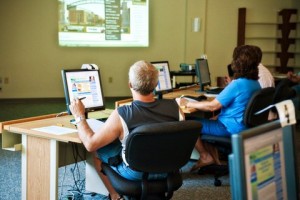 If you have ever been laid off, you won’t easily forget it. I was 31 and had been with my company for 11 years. I loved my job and the company I worked for – and yet that was the year I found myself unemployed. My position had been outsourced.
If you have ever been laid off, you won’t easily forget it. I was 31 and had been with my company for 11 years. I loved my job and the company I worked for – and yet that was the year I found myself unemployed. My position had been outsourced.
The emotional impact of being unemployed surprised me. Not only did it feel personal, it impacted my confidence and sense of identity. I would never have guessed that it would throw me so badly. But I knew what I needed to do: I applied for unemployment and started filling out applications. Of course, this was 20 years ago, and the journey to a new job was still paved with paper. I filled out applications and hand-delivered resumes. I went to the unemployment office, filled out paperwork, and waited in the hard plastic chairs until the number on my paper ticket was called. It wasn’t a pleasant process, but I knew it was what every other unemployed adult endured. It was at least a level playing field.
I did not succeed in finding a job, and in the end this meant a short-sale on our home and a move across country to Indiana. But it also meant new opportunities, a re-evaluation of our priorities, and the opportunity to stay home for several years with my daughter – something I wouldn’t trade for anything. Looking back it is easy to see this time as a blessing in disguise. But at the time, it was incredibly stressful.
Twenty years later, I see that same stress on the faces of our library users who are working their way through job losses. The emotion and the stress may be the same, but the details have become incredibly more complicated. The digital age makes our world an amazingly searchable place, but it also adds a necessary skill and resource to that search. Being qualified for a job is no longer enough. Even if you want to work in a job that requires absolutely no computer skills, odds are you do need those computer skills to apply.
According to the latest Pew Research Survey, 65% of Americans have broadband internet at home. I am fortunate to be one of those. Maybe you are as well. But in fact it wasn’t until I became a public librarian that I was able to put faces with the other 35% – my neighbors who do not have ready access to the internet. In Greenwood, this 35% equals roughly 18,000 residents. Not surprisingly, the 35% and the 65% have a lot in common. They work hard, pay their taxes, raise their children – but when those without access to broadband internet are laid off, they find themselves navigating the world of unemployment in the digital age. It is no longer a level playing field.
Fortunately, public libraries provide access to technology and broadband and level the playing field for everyone in our community. This free, tax supported service is essential in our communities. It is unacceptable that 35% of our community who are otherwise qualified should be put at a disadvantage in their job search. In addition to computers and internet access, librarians help job searchers create their first resumes, offer free computer classes to improve job skills, and provide one-on-one consultation to meet the unique needs of each user.
As I write this, the faces of the library patrons I have helped come to mind. They are your neighbors, your family, your friends. We get to know the patrons who visit every day searching for jobs online, creating resumes, or filing for unemployment. We take their job searches almost as personally as they do – and their successes motivate us to fight to preserve the service that leveled the playing field for them when they needed it most: The Public Library.
Sometimes I wonder if we should rename the Public Library. After more than a century of history in America, the public library has radically changed – it is a dynamic and flexible institution committed to meeting the needs of every resident and yet many of the 65% consider it a luxury or think it is a relic of the past. But when I see GPL with a full parking lot, well-used computers and wifi, and hundreds of thousands of books checked out each year, I know that there’s more to the public library than the stereotype would imply.
Should we rename the public library? Something catchy, something without the dusty connotations . . . or maybe it’s just as important to remember that the Free Public Library is still just that, and that it still functions to improve life for every citizen, just as its greatest American proponent hoped it would:
There is not such a cradle of democracy upon the earth as the Free Public Library, this republic of letters, where neither rank, office, nor wealth receives the slightest consideration. ~Andrew Carnegie
